
BY SCOTT STIFFLER | March 31, 2021: Heady jubilation akin to a contact high spreads across Chelsea like smoke wafting up the neck of a long glass bong, when New York State (NYS) legalizes the recreational use of cannabis by adults, 21+. To usher in a new commercial landscape actualized by cannabis cultivation, distribution, and sale, a Cannabis Control Board is formed to oversee and implement the Marihuana Regulation & Taxation Act (MRTA). Also established is the Office of Cannabis Management (OCM), tasked with developing regulations, issuing licenses, and operating NYS’s existing Medical Marijuana and Cannabinoid Hemp programs.
For those locked into the woeful routine of waiting hours or even days for an unreliable source to deliver “weed” of inconsistent quality, volume, and price, the notion of exiting a well-staffed retail establishment in broad daylight with regulated product and a receipt seemed impossibly distant. MRTA would change that—but not right away. OCM’s mandate to essentially create a new industry from the ground up—along with legal challenges—meant it would be nearly two years before the state’s first legal, licensed cannabis dispensary made its brick and mortar debut.
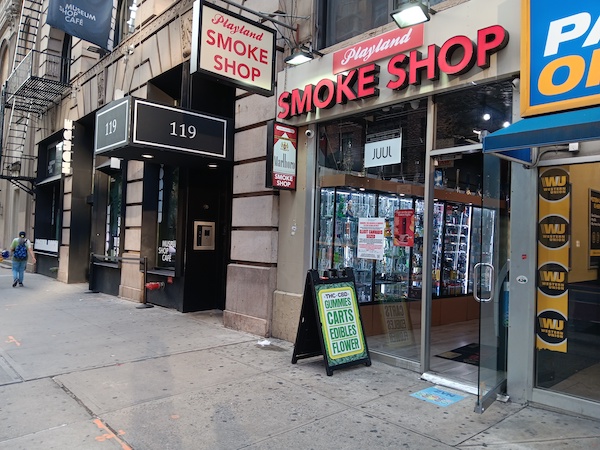
In the meantime, with money to be made, smoke shops swooped in to fill the void. Seemingly overnight, they seemed to be everywhere, selling cannabis with no legal authority to do so. By 2023, according to a NY Post report (click here to read it), their combined five-borough head count ranged from 1,500 to 2,500.
That’s a big range—but if the number of smoke shops is debatable, there’s little doubt about their ubiquity. (Stroll through Chelsea and it’s not unusual to see one every few blocks; the 100 block of West 23rd Street has two of them.) Illegal and unlicensed, they’ve been difficult to close en masse, despite ongoing solo and coordinated efforts from City and State. Their brightly lit exterior signage and hand-drawn cartoon characters that engage juvenile eyes are among the quality of life concerns residents bring to community boards, the NYPD, 311, and electeds. Cash is king and staffing is minimal, adding to the perception that smoke shops are soft targets for robbery. Worst of all, their doobies are of dubious distinction, possibly dangerous, even: “Some illegal cannabis shops operating in NYC are selling weed contaminated with salmonella and pesticides, survey says,” read the long but comprehensive headline trumpeting a Business Insider report of December 3, 2023.;
Coming in at a very close Second Place in the”Worst of All” category is the high price paid by bottom line: Every cannabis sale that takes place in a smoke shop chips away at the legal dispensary’s tax-generating potential. As the OCM notes in their What is in the Law: Taxation and Revenue document (click here to access it), revenue from adult-use cannabis sales are distributed thusly:
–20% to the Drug Treatment and Public Education Fund.
—40% to the State Lottery Fund for education purposes. The revenue from the fund must be additional spending on education and not supplant existing revenue sources.
—40% to the Community Grants Reinvestment Fund (distributed to Community-based nonprofits and local governments to support revitalization efforts including adult education, housing, financial literacy, nutrition services, and afterschool and childcare services).
All told, according to data from a 2018 Estimated Tax Revenues from Marijuana Legalization in New York documetnt (generated from the office of then-NYC Comptroller Scott Stringer; click here to access it), tax benefits of the legal, adult-use marijuana market “could conservatively yield annual tax revenues of as much as $1.3 billion total at the State and City levels.” As for the most recent data, the January 25, 2024 OCM newsletter, sent to subscribers via email, noted that with only a handful of legal dispensaries in operation, “Our budding #NYcannabis market generated over $150 million in retail sales in 2023, showcasing the potential and growth of the industry.”
On December 29, 2022—with the smoke shop explosion in full swing—NYS took a definitive step out of the weeds and into the world of tax-generating sales by opening its first legal cannabis dispensary. Located at 750 Broadway in the East Village, the operating license for Housing Works Cannabis Co. is held by Housing Works, a drug treatment provider (among other things) whose “mission is to end the dual crises of homelessness and AIDS.” The products offered by Cannabis Co., notes its website, are “from LGBTQ+, BIPOC, and women-led brands, as these communities have been disproportionately affected by drug criminalization.”
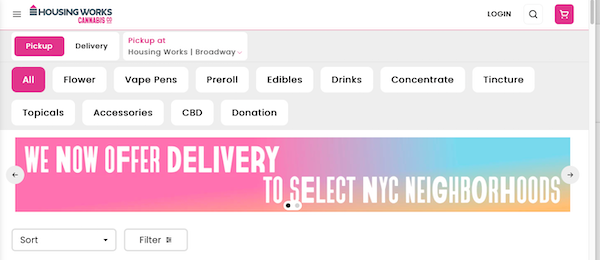
Demonstrating the budding industry’s dazzling profit potential, Cannabis Co. did $12 million in sales during its first six months. What’s more. linking what’s on their shelves to what’s in their mission statement validates OCM’s leap of faith, confidently executed by making Cannabis Co. one of the 463 in NYS’s first-ever batch of successful license applicants—all of whom had nonprofit status or a justice-related experience (i.e. having been prosecuted/incarcerated on a pot-related charge). Either of those qualifiers, along with past experience running a successful business, automatically puts their application up for review. Giving CAURD (“Conditional Adult Use Retail Dispensary”) applicants first dibs also made possible the January 12, 2024 opening of the only legal cannabis dispensary currently located in Chelsea: Verdi Cannabis (click here for our coverage of their opening day).
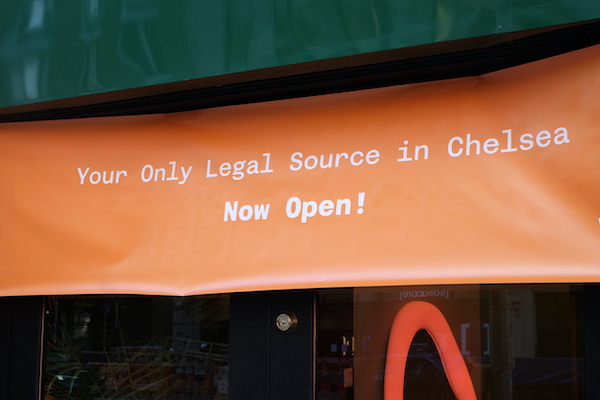
Located at 158 West 23rd Street (btw. 6th & 7th Aves.), Verdi Cannabis is owned and operated by the Soodak family, whose experience running NYC liquor stores allowed them to present as uniquely qualified cannabis license applicants. Click here to read our August 28, 2023 article based on their appearance before the Manhattan Community Board 4 (CB4) Cannabis Working Group (click here to view that meeting). Impressed by their presentation and moved by their backstory, the Working Group (and later, CB4’s full board) let the OCM know there was support for a Soodak-owned cannabis dispensary in Chelsea.
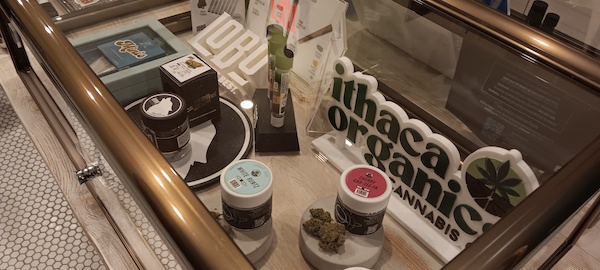
The family’s CAURD qualification traces back to the 1960s, when the family patriarch (currently in his 70s) was a college student whose arrest for marijuana possession contributed to his father’s fatal heart attack. Back then, a pot bust could ruin reputations and end careers—and convictions could lead to incarceration for decades, even life. (When cannabis became legal in NYS, all marijuana-related charges were expunged from a person’s criminal record.)
With each new cycle of license applications, OCM will continue to bolster Social and Economic Equity (SEE) applicants by, they note, actively promoting “the participation of individuals from communities disproportionately impacted by cannabis prohibition policies, minority and women owned businesses, distressed farmers, and service-disabled veterans.”
Ironically, it was that last group mentioned who would be responsible for delaying the retailer rollout process. Litigation brought by four U.S. military veterans shut out of OCM’s group of 463 license holders soon managed to delay ready-for-business dispensaries from making their debut. To learn more about the litigation’s early days, click here for an August 8, 2023 report from High Times, a source of journalism uniquely qualified to put pot-centric matters into proper context. They did just that, again, in the November 29, 2023 article whose headline noted, “New York Cannabis Regulators Reach Settlement in Lawsuit Blocking Dispensary Openings.”
Said OCM Executive Director Chris Alexander, upon news of the settlement, “We launched the CAURD program squarely focused on realizing the commitment made by the MRTA, that those most impacted by prohibition would have a meaningful opportunity to participate in New York’s cannabis market… New York’s cannabis market was designed to be the most equitable market in the world. We remain undeterred by the challenges of standing up that new market, and believe that the expansion of licensing opportunities and the inclusion of our medical operators will collectively ensure the success of the adult-use program.”
Currently, OCM finds itself ready to review a new batch, or group, or round (their term is “buckets”) of applications—2,232 of them—from which 250 will receive licenses. Each aspirant in this group was required to have secured a retail location accompanied by an executed deed or an executed lease agreement. On Friday, January 12, OCM published that list of applicants on their website, ranked from 1 to 2,232. Where applicants placed in this “lottery” was explained thusly at the top of the document (which can accessed online by clicking here):
The queue below was created using a random sequence process for non-provisional Adult-Use Microbusiness and Retail Dispensary applications, that applied in the application window ending on November 17, 2023, at 5:00PM. A single queue was created, providing the Office with the order in which to review Adult-Use applications. The random queuing process was audited by an independent third-party to ensure it was random and unbiased. IMPORTANT: The queue order solely determines the order in which the Office will begin the review of each application. The order does not indicate the order in which licenses will be issued. Each application is different, and the length of the review time will vary from application to application. Inclusion on this list is not a guarantee of licensure and is not an indication of sufficient eligibility for a license.
The OCM’s placement of the queue info on their website happened with little fanfare (no press release was sent out) and no notification—in advance or after the fact—to anyone other than the applicants, including media and external vetting sources such as CB4. News of the queue’s release did, however, arrive in email IN boxes, as an OCM newsletter item—and that, moving forward, is how they recommend staying informed about such developments. To subscribe, click here.
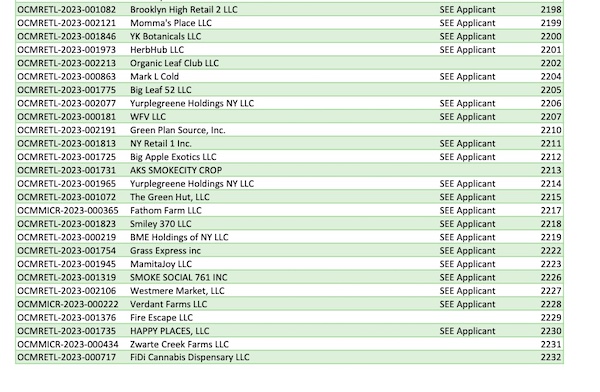
With the applicants randomly ranked, OCM reviews applications in numerical order. If application #1 meets all requirements, a license is granted. If an application lacks any necessary info, applicants are told so and given 30 days to resubmit. If that deadline is missed, if an applicant withdraws, or if OCM ultimately rejects an application, a new one is chosen from the queue—beginning with applicant #151, then #152, and so on and so on until all 250 licenses have been assigned.
This review period is also when the OCM considers feedback from outside sources. Applicants are expected to contact those sources, with the OCM noting:
Only applicants seeking an adult-use retail dispensary, microbusiness (with retail authorization), ROD, or on-site consumption license, are required to notify the municipality, or in New York City, the appropriate community board in which the premises is located. Notification must be made between thirty (30) and two hundred and seventy (270) days prior to filing an application for licensure. Proof of this notification will be requested in the application.
That text appears on page 42 of OCM’s General Licensing Application Frequently Asked Questions document, accessible online by clicking here. Packed with plain language used to convey the essece of OCM policies and procedures, its 49 pages are required reading for determined applicants, of course–alongside anyone seeking to bring a solid grasp of the facts (and maybe even a little nuance) to the public discourse that’s already begun and will continue to grow parallel to, if not in proportion with, NYS’s cannabis industry.
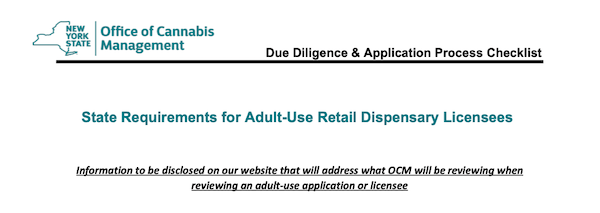
Also informative for Adult-Use Retail Dispensary license applicants and casual conversationalists alike is the OCM-generated Due Diligence & Application Process Checklist document. Its introductory page can be seen in the image directly above (a screenshot taken by CCNews). The document can be accessed online by clicking here. It’s meant to serve as an “overview of some of the components that the Office reviews during the application process that may be of particular interest to local municipalities, including New York City Community Boards.”
For more information on the role Manhattan Community Board 4 (CB4) plays in OCM’s review of applications, a link will be provided in this paragraph, when CCNews publishes a companion piece to the article you’re reading now. Its topic: The formation of CB4’s Cannabis Task Force and the work it’s doing in support of OCM’s application review process. To view the January 2024 Cannabis Task Force meeting, click here for access via CB4’s YouTube channel.
Speaking to Chelsea Community News on background, an OCM spokesperson estimated it will take until as late as the end of March to complete the application review process and assign those 250 licenses. Once that’s been accomplished, work begins with a new “bucket,” following the same vetting process until licenses are assigned to the first 250 qualified applicants. The pool of hopefuls is drawn from those who’ve not yet secured a retail location and met the December 18, 2023 deadline for submitting an application.
By or around late June, based on past timetables (themselves a product of the educated guesstimate), one could reasonably expect the OCM to have completed work on this, the final currently scheduled “lottery.” At that time, they’ll assess the situation throughout NYS and use their discretion to continue vetting new batches of applicants. No minimum or maximum limit has been set on how many licenses OCM can issue. And if a retailer decides to go out of business, their non-transferable license reverts back to NYS, which will assign it to another applicant if and when they so choose.
But what’s to come of the majority of applicants who’ve no reasonable expectation of receiving a license (a group that includes proposed dispensaries in Chelsea and its nearby neighborhoods)? While making the top 250 is cause for legitimate if premature celebration, it’s safe to say applicant #2000, for example, will not be setting up shop as a result of this particular lottery. They are, however, welcome to take their chances again (and again, and again) by submitting a fresh, new application whenever there’s a lottery for which they qualify. This is the “playing the long game” gamble that applicants with time and money on their side are betting–and banking on; that eventually, their number will come up and they’ll open a dispensary that will generate profit in perpetuity. That’s the stuff of speculation, of course, but whether or not a returning applicant is successful the next time around, one advantage is guaranteed–and it’s one they share with community boards, municipalities, and the OCM itself: The experience gained from having already gone through the process.
Chelsea Community News will continue to report on NYS’s legal cannabis industry. To continue as a reader of that reporting, click here to become a subsciber to our free Enewsletter.
—END—
Chelsea Community News is an independent, hyperlocal news, arts, events, info, and opinion website made possible with the help of our awesome advertisers and the support of our readers. Our Promise: Never a paywall, no pop-up ads, all content is FREE. With that in mind, if circumstances allow, please consider taking part in our GoFundMe campaign (click here). To make a direct donation, give feedback, send a Letter to the Editor, or contact our founder/editor, send an email to Scott Stiffler, via scott@chelseacommunitynews.com.
To join our subscriber list, click here. It’s a free service providing regular (weekly, at least) Enewsletters containing links to recently published content. Subscribers also will be sent email with “Sponsored Content” in the subject line. That means it’s an exclusive message from one of our advertisers, whose support, like yours, allows us to offer all content free of charge.

You must be logged in to post a comment Login